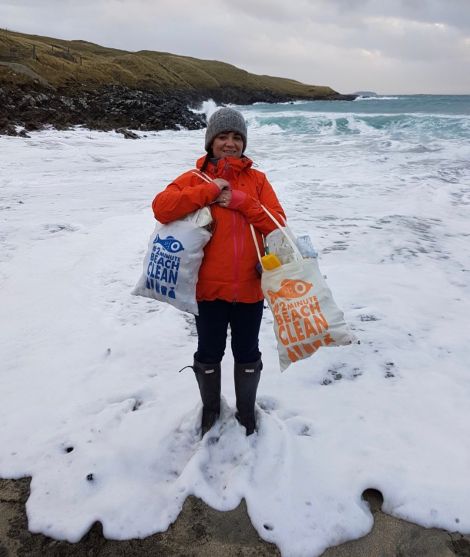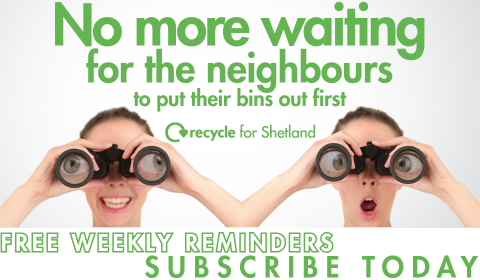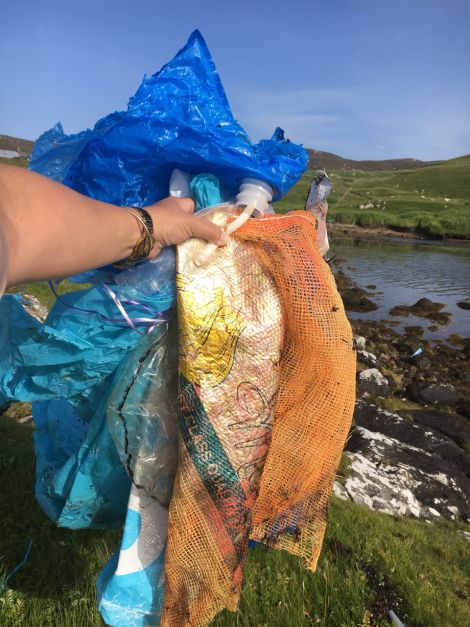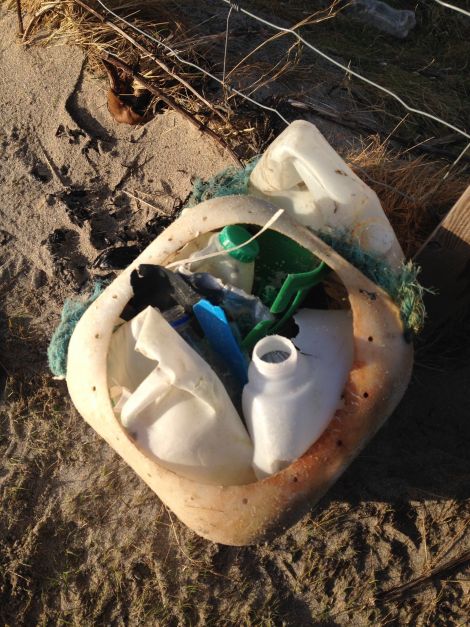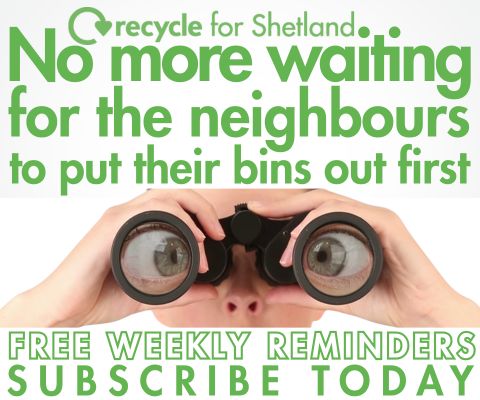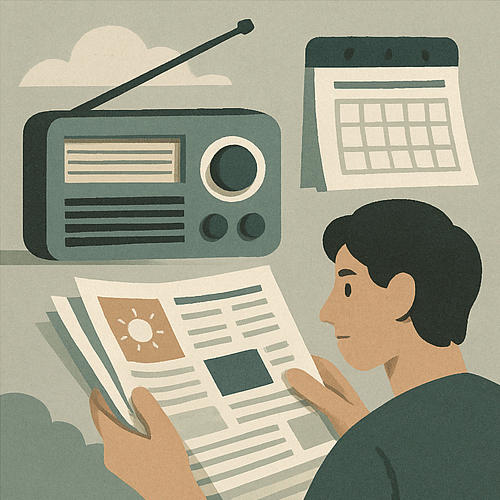News / ‘We all have the ability to do something to help stop plastic entering the ocean’
THE MOUNTAIN of excessive plastic waste caused by Western societies has been under the microscope more than ever in recent weeks – and a Lerwick woman who has quietly been doing her bit to clean up Shetland’s beaches as part of the non-profit #2minutebeachclean initiative is encouraging others to get involved.
Rachel Laurenson, who takes her dogs on coastline walks around Shetland most days, said she first came across founder of the #2minutebeachclean Martin Dorey on Instagram in February 2014.
The beauty of the initiative is in its simplicity: spend as little as a couple of minutes collecting rubbish washed up on the beach, bag it up and then share a picture of what you’ve collected on social media, using the aforementioned hashtag to help spread the word globally.
“Martin came up with the idea of grabbing a few items of rubbish off the beach as you leave because it is something we can all do,” Rachel said. “It doesn’t have to be a huge entire beach clean – the idea is that you just grab what you can carry and put it in a bin or the recycling.
“That’s it, job done. Simple. From bairns to grandparents, we can all grab that handful of litter as we leave and it’s not an inconvenience or a trial.
“So, being someone who walks a lot and lives in Shetland where there is plenty of coast, it made me stop and think. It’s very doable even with the dogs in tow.”
Rachel walks on the islands’ beaches almost every day and, while she had always been aware of rubbish washing up on the sand, she was “noticing that more and more stuff was piling up”.
“So on my next dog walk, I happened to find a partially broken drum on the beach and I just wandered along, packed in what I could and that was the start of it.”
Become a member of Shetland News
She has been doing two-minute beach cleans ever since and has a stockpile of the non-profit organisation’s bags to distribute to others who want to get involved. Its website and related app are full of tips and valuable information to “help fight the plastic tide”.
The founders of the movement point out that there are a host of reasons why plastic does not belong in the marine environment.
Old fishing nets can entangle as many as 135 different species; plastic breaking down into smaller and smaller pieces can be eaten by wildlife and then enter the food chain; plastics absorb harmful toxins in seawater that can accumulate up the food chain; animals and birds mistake plastic for food and eat it – for example, turtles mistaking plastic bags for jellyfish – which ultimately kills a lot of species which are unable to regurgitate or pass it.
Rachel said there were around 57,000 Instagram posts using #2minutebeachclean-related hashtags and it is “amazing how the word has spread in such a short period of time”.
On days when she collects too much rubbish to carry home, Shetland Amenity Trust and Da Voar Redd Up “come in to save the day”.
“If you stash the rubbish securely in their bags they will collect it from an accessible place,” she said. “It doesn’t have to be at Voar Redd Up time – they can collect all year round.
“As a family group we have done many a big clean up the length and breadth of Shetland. We have a few favourite haunts that we know are less accessible and my kind family are very willing to lug it all up the hills and across dales to get it to the roadside for collection.”
Rachel said her main quest was to continue picking away and encouraging as many folk as possible to get involved. She has a few local followers who do regular beach cleans and “we ask no credit or glory – we just want to post to encourage others to do the same and spread the word”.
“The bairns can join in and a lot of the bairns have got excited about helping now after watching Blue Planet, so we need to strike while the iron is hot and keep up the momentum. Education is the key and these bairns are the future, so let’s help them understand – and make it fun, too.
“Unfortunately, every bit of plastic ever made is still here on this planet – it only breaks up, it never goes away. Most of what I find are sadly plastic bottles and human laziness rubbish, especially in the summer from picnics and barbeques.
“Another pet hate of mine, which I find regularly is plastic strapping, a horrid death trap to seals and marine mammals while still in the round. The amount of little pieces of net and rope from mending I find are huge.”
From time to time she finds treasure: “I’ve found a sea bean, a tropical plant that has floated across on the ocean currents. And of course sea glass and pretty pottery chunks are always a good find.
“I put these in old jam jars and have a little display on the window. Then there’s the mermaids purses, which you can take home and identify with a little help from the Sharks Trust website. So it doesn’t all have to be about picking up rubbish, there are exciting and interesting aspects to what you find too.
“Some of the rubbish is interesting too. I often find lobster pot tags from America. I google the information on the tag to see which state it come from and the date is sometimes legible on it too. The earliest one I’ve found is form 2007 and looks quite pristine, which goes to show how little plastic degrades.”
Rachel is excited by the social media awareness of cleaning beaches, parks, roadsides and streets, and very happy that more and more people are making an effort to reduce plastic.
She commended local shop owner and councillor Ryan Thomson’s campaign to eradicate unnecessary single-use plastic from the islands.
“Hopefully this will grow and supermarkets and plastic bottle producers will step up and help us to help save the planet. I am 100 per cent behind what Mr Thomson is trying to do with the local shops and it’s great to see how many have taken the pledge already.”
She was also pleased that Facebook page Shetland Photo a Day Challenge made the #2minutebeachclean hashtag its theme for the day last weekend.
Rachel added: “’The World is Blue’, to quote Sylvia Earle, and every breath we take is only there because of the ocean. So let’s all help heal it in whatever way we can, whether it’s by picking up litter or not buying that single use item anymore.
“We all have the ability to do something to help stop plastic entering the ocean and another creature is saved from ending up with it in its belly having mistaken it for food.”
- You can read more about the #2minutebeachclean here.
Become a member of Shetland News
Shetland News is asking its readers to consider paying for membership to get additional perks:
- Removal of third-party ads;
- Bookmark posts to read later;
- Exclusive curated weekly newsletter;
- Hide membership messages;
- Comments open for discussion.
If you appreciate what we do and feel strongly about impartial local journalism, then please become a member of Shetland News by either making a single payment, or setting up a monthly, quarterly or yearly subscription.




